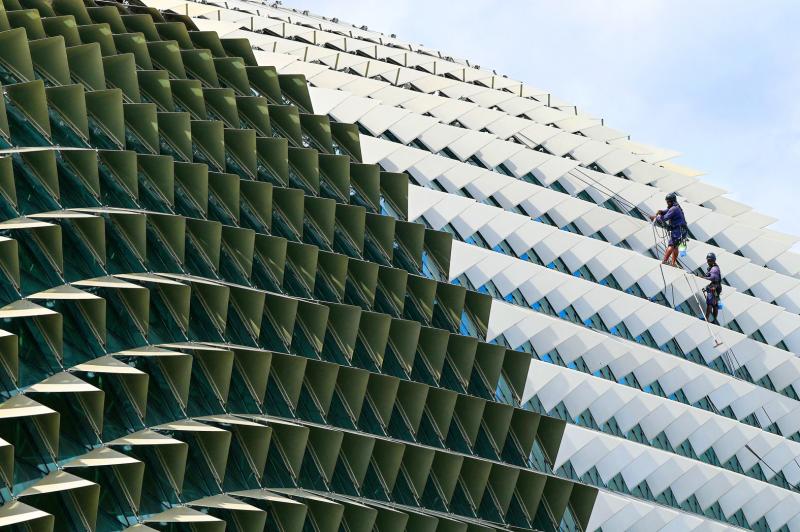Singapore plans to set up pilot programs to allow business travelers vaccinated against COVID-19 from some countries to enter on controlled itineraries next month as it charts a cautious international reopening that extends to local restrictions.
Singapore is in talks with Germany, Australia, Canada and South Korea to be the first batch of countries for such arrangements, although it is also looking at the possibility of leisure travel, Singaporean Minister for Trade and Industry Gan Kim Yong (顏金勇) told Bloomberg News in an interview yesterday.
Factors such as infections, vaccination rates and the ability to control outbreaks would be considered in these discussions, Gan said.

Photo: AFP
“In the pilot, we are likely to focus more on business travel, but beyond business travel, we are also looking at the possibility of leisure travel, particularly to those safer countries, those with a lower infection rate,” he said. “We will need to pilot-run some of this with an organized itinerary, probably with organized tour groups, to be able to find ways to bubble-wrap them for the journey and with specific designated places that they can visit.”
Singapore — which has a vaccination rate that is among the world’s highest, according to Bloomberg’s Vaccine Tracker — is aiming to reopen to the world and emerge from the pandemic relatively unscathed by high hospitalizations and death tolls.
At 76 percent full inoculation, the country is on track to be ahead of its schedule to reach 80 percent by early next month, a milestone where officials have pledged to ease more measures, particularly on border reopening.
Still, such relaxation will be done in a careful manner and local rules on gathering sizes could still be intact for a while as more people enter the country, Gan said.
“The two are interlinked,” he said. “If we continue to keep our borders closed and just among ourselves, I think we will be quite ready to open up domestically, but because we are going to open up the border, which is a major effort, and potentially a higher-risk measure, therefore we will need to ensure that domestically within the community we continue to have reasonable basic safe management measures in place.”
Already, Singapore is loosening controls to allow vaccinated foreign workers to enter the country, as well as plans to bring in laborers in the construction sector.
“We may be the first country who has a high vaccination rate, and yet taking a step-by-step approach to reopening,” Gan said. “We are seeing whether this approach in fact is a better approach to allow a safe opening, yet at the same time allow more activities to happen.”
Such a move might ultimately prevent a reversion to lockdown measures, which have frustrated businesses and residents, he said.

Vincent Wei led fellow Singaporean farmers around an empty Malaysian plot, laying out plans for a greenhouse and rows of leafy vegetables. What he pitched was not just space for crops, but a lifeline for growers struggling to make ends meet in a city-state with high prices and little vacant land. The future agriculture hub is part of a joint special economic zone launched last year by the two neighbors, expected to cost US$123 million and produce 10,000 tonnes of fresh produce annually. It is attracting Singaporean farmers with promises of cheaper land, labor and energy just over the border.

US actor Matthew McConaughey has filed recordings of his image and voice with US patent authorities to protect them from unauthorized usage by artificial intelligence (AI) platforms, a representative said earlier this week. Several video clips and audio recordings were registered by the commercial arm of the Just Keep Livin’ Foundation, a non-profit created by the Oscar-winning actor and his wife, Camila, according to the US Patent and Trademark Office database. Many artists are increasingly concerned about the uncontrolled use of their image via generative AI since the rollout of ChatGPT and other AI-powered tools. Several US states have adopted

A proposed billionaires’ tax in California has ignited a political uproar in Silicon Valley, with tech titans threatening to leave the state while California Governor Gavin Newsom of the Democratic Party maneuvers to defeat a levy that he fears would lead to an exodus of wealth. A technology mecca, California has more billionaires than any other US state — a few hundred, by some estimates. About half its personal income tax revenue, a financial backbone in the nearly US$350 billion budget, comes from the top 1 percent of earners. A large healthcare union is attempting to place a proposal before

KEEPING UP: The acquisition of a cleanroom in Taiwan would enable Micron to increase production in a market where demand continues to outpace supply, a Micron official said Micron Technology Inc has signed a letter of intent to buy a fabrication site in Taiwan from Powerchip Semiconductor Manufacturing Corp (力積電) for US$1.8 billion to expand its production of memory chips. Micron would take control of the P5 site in Miaoli County’s Tongluo Township (銅鑼) and plans to ramp up DRAM production in phases after the transaction closes in the second quarter, the company said in a statement on Saturday. The acquisition includes an existing 12 inch fab cleanroom of 27,871m2 and would further position Micron to address growing global demand for memory solutions, the company said. Micron expects the transaction to